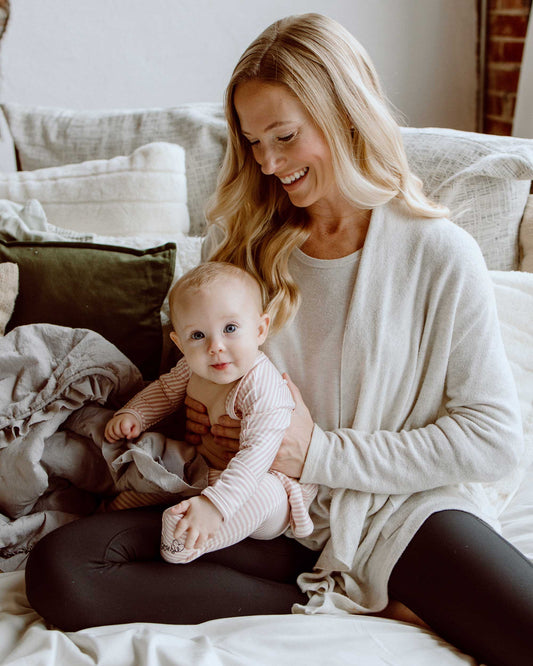Share
You're Expecting! Now What Can You Expect Sleepwise...
Amritpal Singh
So you’ve attended the birthing classes, folded all of the baby clothes and purchased that last baby item off of your registry. But, when baby arrives, what can you expect sleep-wise? I personally left the hospital with my little one knowing she would essentially just eat, sleep, and poop those first couple of weeks but I didn’t know where to start with the sleep aspect of that cycle!
Your life has already been turned upside down so I want to provide you with newborn sleep information that can give you the confidence and tools you need to feel prepared and establish a healthy sleep foundation from the beginning.
Let’s face it, mom brain really does exist
First off, save this chart and put it somewhere where you can constantly refer to it – because let’s face it, mom brain really does exist and it’s hard to remember when you last ate! As you can see, newborns need A LOT of sleep! A wake window is the time your baby can be comfortably up between naps (or between last nap and bedtime) during the day.
There is so much to learn when you’re a new parent or even with a new baby who may act differently or have other preferences than your previous children. And on top of that, there are so many resources flooding the Internet! So instead of telling you what to do, here are the common sleep mistakes that can happen with newborns so you can try avoiding them before they even occur:
- Waiting too long to put baby down between naps or putting baby down too early. Either of these can often cause cat naps (under 40 minutes). Take a look at the recommended wake windows chart and remember that babies often start their day at the shorter end of the wake window range and build up to the longer stretch as the day progresses.
- Putting too many items in and around the baby’s crib: Putting too many items in and around the baby’s crib
- Keeping the baby too warm in blankets/clothing. Overheating can actually cause your baby's sleep to be disrupted. Keep the room between 68-72 degrees Fahrenheit and dress them in one more layer than an adult – so a swaddle or sleep sack is perfect as that extra layer!
- Not establishing a distinction between night and day - you'll want to stop this sooner rather than later! Make daytime super engaging and interesting and make evenings more calming by dimming the lights, lowering the blinds and keeping TVs/devices at a lower volume. Cap naps at 2 hours each if you do see them experiencing this confusion so you can ensure they get those longer stretches at nighttime.
- Assuming the sleepy newborn stage lasts forever - around 6 weeks you'll notice your baby "turns on"! They'll now be more particular with the environment in which they fall asleep in and how they fall asleep. So make sure they see consistency of the routine in their room so they can more easily go to sleep – nurse/bottle, diaper change, swaddle/sleep sack on, song, sound machine on (white noise not nature sounds), lights off.
- Letting baby sleep in the car seat or swing. The occasional nap in the car seat or baby swing is unavoidable but ultimately you want to set consistent nap times in a safe sleep environment. Aim for at least one nap a day in the crib or bassinet.
- Not keeping up with tummy time/letting newborns stay on their backs all the time. This is a tough one because they’re supposed to sleep on their backs to avoid SIDS but it’s equally important to have tummy time during the day so that their heads don’t become flat and so that they can also build upper body/neck strength.
- Trying to get baby on a schedule too early! There is sometimes so much pressure about getting baby on a schedule – I’m here to tell you that the bond you form with your baby is more important than that! I love how Bonsie can help deepen and establish that bond. Around 8 weeks is a more typical time to start a feeding and sleep schedule as this is when their internal clocks become more predictable and it then also follows the 2 month well visit to ensure your baby’s growth is on track.
- Trying to force sleeping through the night. Your newborn baby might be sleeping through the night at 8 weeks or it may be months later! You may get a lucky night where she sleeps all night and then obsess why it never happened again! Newborn sleep can be inconsistent so try not to force it if it's not happening naturally! It won’t be like this forever!
So here’s to "thriving" during the fourth trimester, not just "surviving!" And while it's so tempting to compare babies, enjoy your baby as much as possible during these first few weeks. Amidst the lack of sleep, the stress and the adjustments to life, try to soak up these fleeting moments and remember your best is always enough for your baby. And if you ever need judgment-free sleep support please don’t hesitate to reach out – there is no shame in building your village!
Julie Connelly
Founder,The Sleepyhead Coach
Email: Julie@thesleepyheadcoach.com
Julie Connelly is a certified infant and toddler sleep consultant and the founder of The Sleepyhead Coach. She takes great pride in the progress and success of her clients and takes a holistic look at what is at the root of your child's sleep issue and works with you to implement a plan that aligns with your parenting philosophy.
Share
-
Category:
- All posts



